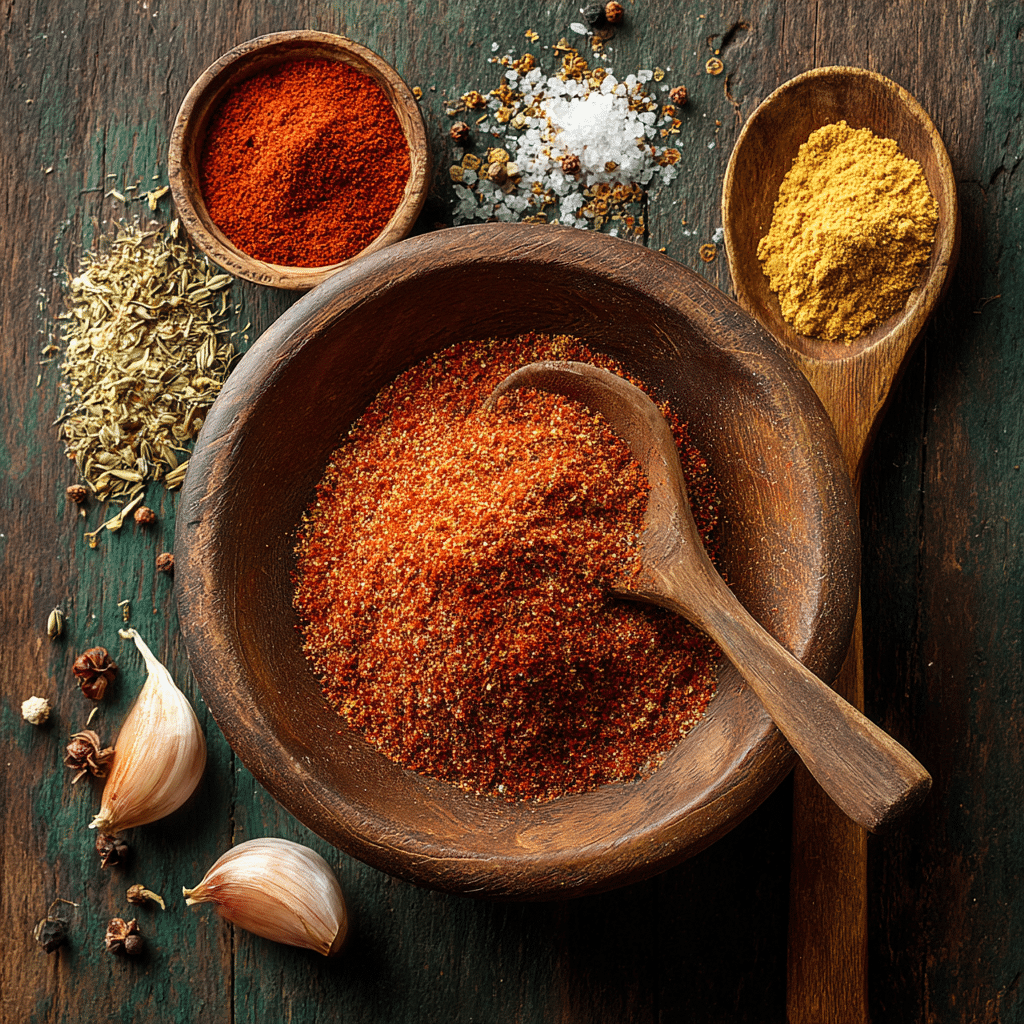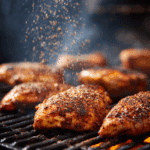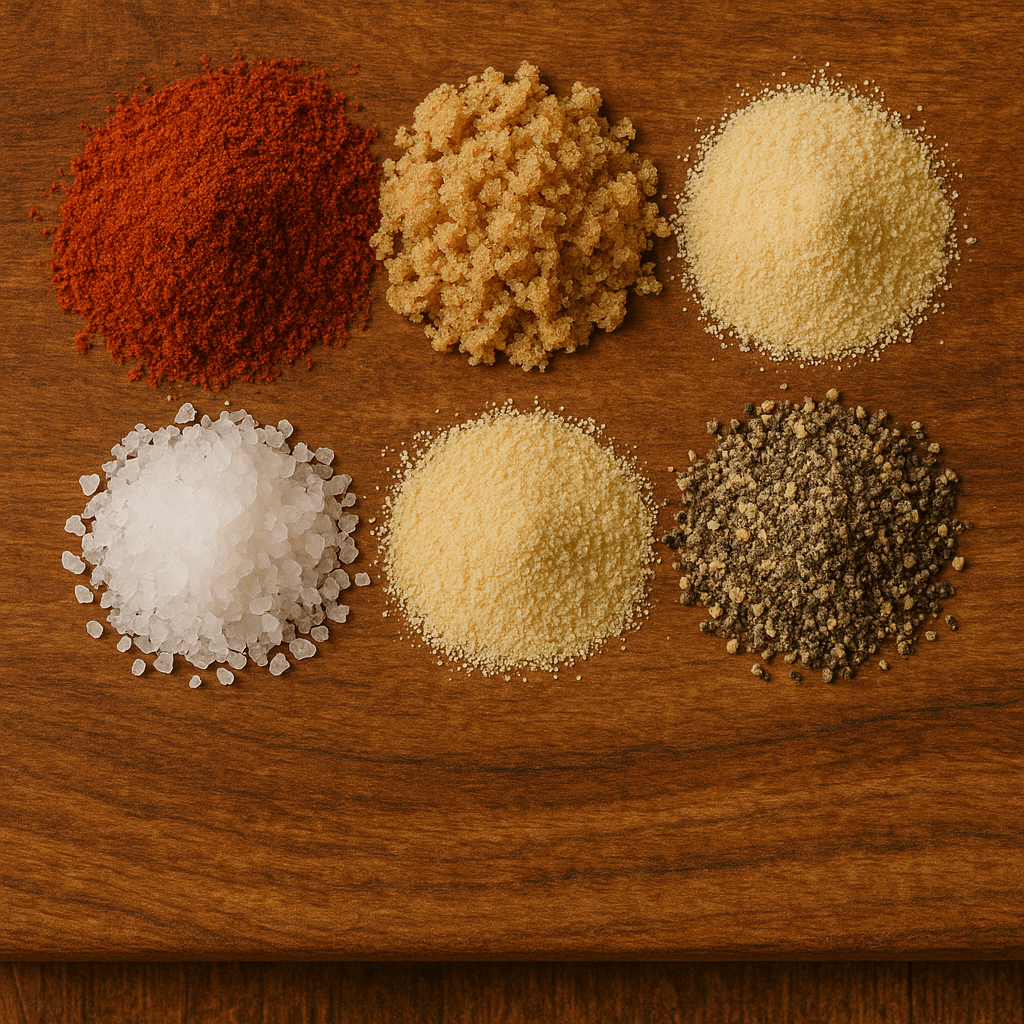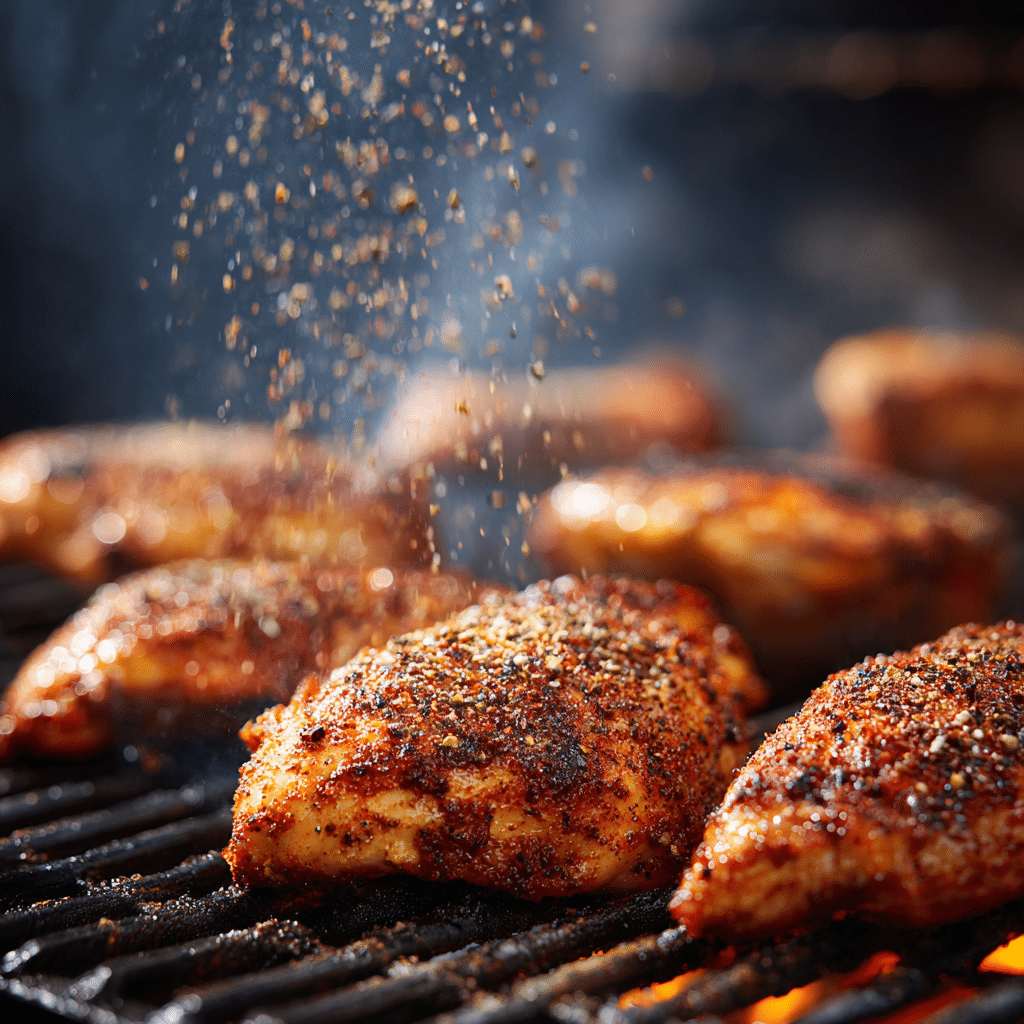BBQ seasoning is the heart and soul of any great barbecue. Whether you’re grilling ribs, chicken, or vegetables, the right blend of spices can make all the difference. This article explores how to make homemade BBQ seasoning, its essential ingredients, and how to customize it for any meat.

We’ll dive into what makes a great BBQ rub, the science of the flavors, and how to whip up a quick version when you’re short on time. You’ll also get my go-to homemade recipe—flavor-packed, versatile, and pantry-friendly. Let’s fire up the grill and mix some spice magic!
Table of Contents
The Story & What Makes a BBQ Seasoning Special
A childhood memory sparked my BBQ obsession
Growing up, our backyard turned into a grill master’s haven every weekend. My mom had this weathered spice tin she called her “magic box.” The smell of smoky paprika, brown sugar, and garlic would fill the kitchen long before anything touched the grill. That homemade BBQ seasoning of hers made every cookout unforgettable.
Years later, when I started barbecuing on my own, I chased that nostalgic flavor with every store-bought rub—but none measured up. So, I decided to recreate it. After a lot of experimenting and taste-testing, I found the perfect balance—sweet, smoky, salty, and just enough heat. This DIY BBQ seasoning became my must-have for everything from ribs to barbecue fries and even grilled cauliflower steaks.
One of the biggest perks? It’s clean. No anti-caking agents or mystery fillers like some commercial blends. You can pair it with bold sauces like my 3-ingredient BBQ sauce or more complex ones like chipotle barbecue sauce, depending on the flavor profile you want.
What is BBQ seasoning made of?
A classic BBQ seasoning includes smoked paprika, brown sugar, garlic powder, celery salt, dry mustard, black pepper, and kosher salt. These ingredients bring sweetness, smokiness, heat, and savory depth. Want to make it healthier? You can always cut the sugar or swap in options from our low-calorie barbecue sauce guide. Whether you’re cooking chicken or jazzing up barbecue mac and cheese, this spice blend adds flavor without overpowering.
Print
BBQ Seasoning Recipe
- Total Time: 5 mins
- Yield: 6 servings 1x
Description
A smoky, sweet, and savory BBQ seasoning perfect for grilling meats, veggies, or adding flavor to sauces. Quick to make and pantry-friendly.
Ingredients
1 Tablespoon smoked paprika
2 teaspoon brown sugar
1 teaspoon celery salt
1 teaspoon garlic powder
1 teaspoon dry mustard
½ teaspoon black pepper
1 ½ teaspoon Kosher salt
Instructions
1. Mix ingredients in a bowl.
Notes
Store in an airtight container for up to 6 months. Shake before each use. Great on ribs, chicken, or roasted vegetables.
- Prep Time: 5 mins
- Cook Time: 0 mins
- Category: Spices & Seasonings
- Method: Mixing
- Cuisine: American
Nutrition
- Serving Size: 1 tbsp
- Calories: 33
- Sugar: 3g
- Sodium: 2911mg
- Fat: 0g
- Saturated Fat: 0g
- Unsaturated Fat: 0g
- Trans Fat: 0g
- Carbohydrates: 6g
- Fiber: 1g
- Protein: 1g
- Cholesterol: 0mg
Customize BBQ Seasoning for Any Meat
Best BBQ seasoning combos for chicken, pork, and beef
The beauty of BBQ seasoning is its adaptability. While the core mix remains the same, slight tweaks can elevate it for different meats. For chicken, a bit more brown sugar enhances caramelization, while extra garlic powder adds bold flavor. When seasoning pork, I like to punch up the paprika and dry mustard—this combo cuts through the fat and brings out natural sweetness.
Beef benefits from earthier, peppery blends. Try increasing the black pepper and adding a pinch of cayenne. It’s perfect for cuts like brisket or grilled short ribs. For a Southern-style twist, mix your BBQ rub with a splash of vinegar before marinating, inspired by my vinegar-based barbecue sauce recipe.
If you’re aiming for a healthier twist, cut the salt slightly and pair your seasoning with a homemade gluten-free barbecue sauce. It delivers flavor without additives, which is ideal for anyone with dietary restrictions.
Quick tips for applying seasoning like a pro
Application matters just as much as the mix. Always pat your meat dry first—this helps the seasoning stick better and creates a gorgeous crust. Use about 1 tablespoon of BBQ seasoning per pound of meat and rub it in evenly on all sides. For deeper flavor, let it rest for 30 minutes or even overnight in the fridge.
Planning to grill veggies or tofu? Sprinkle generously and drizzle with a little oil to help the spices cling. If you’re working on ribs or wings, this rub pairs beautifully with sticky sauces like our buffalo wild wings chipotle BBQ rub or even Asian barbecue sauce for fusion flair.
Storing and Tweaking Your BBQ Seasoning
How to store homemade BBQ seasoning for freshness
Once you’ve blended your BBQ seasoning, proper storage makes all the difference. Always keep it in an airtight glass jar or spice container, away from direct sunlight and moisture. The pantry is ideal—just make sure it’s cool and dark. With good storage, your homemade mix will stay potent for up to six months. For maximum flavor, give it a gentle shake before each use to redistribute the spices.
If you make large batches, divide the mix into smaller containers so you only open what you need. This helps prevent exposure to humidity that can lead to clumping. You can even label the jar with a date to track its freshness. This works especially well if you’re pairing it with made-from-scratch sauces like cajun BBQ sauce or storing alongside your spice cabinet staples.
Flavorful twists to try—spicy, sweet, or sugar-free
Want to give your BBQ seasoning a bold upgrade? Spice lovers can add ½ teaspoon of cayenne or crushed red pepper flakes. This gives it a satisfying kick—perfect for grilled wings or smoked meats. For a smoky Southern vibe, experiment with chipotle powder or ground ancho chili. These variations pair especially well with dishes like Texas BBQ sausage.
For a sweeter version, increase the brown sugar to 1 tablespoon. This works beautifully when caramelization is key—think grilled pineapple, ribs, or glazed chicken. On the other hand, if you’re watching sugar intake, skip the sweeteners entirely. Use a combo of smoked paprika and dry mustard for a bold, savory blend like we use in our low-sodium barbecue sauce.
Whether you crave heat or want a sugar-free option, your BBQ seasoning can flex to fit your taste and dietary needs.
Rubs vs. Seasonings & How to Make One Fast
BBQ rub vs. BBQ seasoning—what’s the difference?
Though often used interchangeably, BBQ seasoning and BBQ rub serve different roles in grilling. Seasoning is a general-purpose spice blend used to enhance flavor. It can be sprinkled on meat, veggies, or mixed into sauces. A BBQ rub, on the other hand, is typically more intense, coarser in texture, and applied heavily before cooking—often hours in advance.
Rubs are designed to form a crust, locking in juices while delivering bold surface flavor—a process well-explained in this science-based breakdown of dry rubs by AmazingRibs. Seasonings are lighter, perfect for finishing or layering under sauces. For instance, a dry rub made from the same seasoning base can be amplified with additional brown sugar or kosher salt for meats like ribs or pork shoulder.
This distinction becomes especially clear when comparing recipes like our Louisiana BBQ shrimp sauce mix—where seasoning plays a background role—versus Hawaiian BBQ chicken, where a rub adds depth and crust before the sauce goes on.
How to make a quick barbecue rub on the fly

Need something fast? You can create a bold BBQ rub in under a minute using pantry staples. Just mix:
- 1 tablespoon smoked paprika
- 1 teaspoon garlic powder
- 1 teaspoon kosher salt
- ½ teaspoon black pepper
- ½ teaspoon brown sugar
That’s it—rub it generously on meat, let it sit for 10–15 minutes, and you’re grill-ready.
Want to go smoky and spicy? Add ½ teaspoon cayenne or a pinch of chipotle. Need it mild and sweet? Swap the black pepper for onion powder and increase the sugar slightly. This shortcut works wonderfully for smaller dishes like BBQ chicken musubi, where bold flavor is needed without a long prep time.

FAQ Section
What is barbecue seasoning made of?
Barbecue seasoning typically includes a blend of smoked paprika, brown sugar, garlic powder, celery salt, dry mustard, kosher salt, and black pepper. These ingredients create a flavorful mix of sweet, smoky, salty, and spicy notes perfect for enhancing grilled meats and veggies.
What is a BBQ seasoning?
BBQ seasoning is a spice blend used to flavor meats, vegetables, or even snacks before or after cooking, especially on the grill. It’s commonly rubbed onto meat before grilling or smoking and can include sweet, smoky, and savory elements.
What seasoning is best for BBQ?
The best BBQ seasoning includes smoked paprika, brown sugar, and garlic powder as its base. Additions like cayenne, chipotle powder, or mustard powder help tailor it for specific meats like pork, beef, or chicken.
How to make a quick barbecue rub?
Mix 1 tbsp smoked paprika, 1 tsp garlic powder, 1 tsp kosher salt, ½ tsp brown sugar, and ½ tsp black pepper. This simple rub can be made in under a minute and adds instant flavor to any grilled dish.
Conclusion
Creating your own BBQ seasoning isn’t just simple—it’s a game-changer for flavor. From savory ribs to smoky chicken and even grilled veggies, a great blend elevates everything on the grill. With just a few pantry spices, you can ditch store-bought options and enjoy a homemade mix that’s customizable, preservative-free, and tailored to your taste.
This BBQ seasoning recipe is a staple in my kitchen and takes me right back to my childhood cookouts. Whether you’re making a classic sauce like 3-ingredient BBQ sauce or dressing up something bold like chipotle BBQ wings, this blend has you covered.
Go ahead—make a batch today and taste the difference for yourself.
